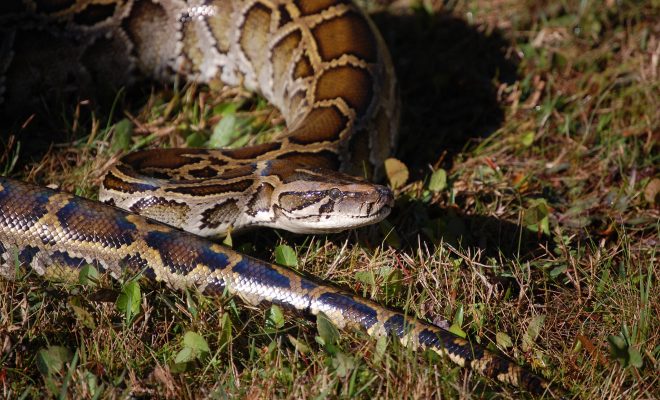 "Python" courtesy of Florida Fish and Wildlife; license: (CC BY-ND 2.0)
"Python" courtesy of Florida Fish and Wildlife; license: (CC BY-ND 2.0)
Weird News
Florida Employs Snake Hunters to Tackle its Burmese Python Problem
In Florida’s Everglades, the Burmese Python population has spread rapidly over the past two decades, thanks to the warm climate and variety of local wildlife that snakes can eat. The Burmese Python is not native to Florida but has spread after many pet owners (illegally) released their snakes in the wild. According to the National Park Service, more than 2,000 pythons have been removed since 2002, but that is likely a very small portion of the total population. The snakes feed on local groups of mammals and birds, and compete with native predators for food, so they could have a big impact on the ecosystem. After trying several different methods of dealing with the problem, authorities have now turned to singing snake catchers from India to try to catch the big reptiles.
Last year, the University of Florida, Everglades National Park, and the Department of Environmental Protection organized the second edition of Florida’s Python Challenge–a competition that urged residents to capture as many big snakes as they could. The month-long challenge, with a thousand participants, resulted in 106 caught pythons. That may sound like a lot, considering that the pythons are huge and well camouflaged. But in only two weeks, the two Indian men, Masi Sadaiyan and Vadivel Gopal, caught 14 snakes—and one was 16 feet long. They are members of the Irula tribe, from South India. The group is famous for hunting snakes.
Irula tribesmen & detector dogs help @UF @usfwsvero & @MyFWC battle #pythons in #Florida https://t.co/VdFicBd73H #snake pic.twitter.com/ZFN0LDNmJ2
— South Florida FWS (@USFWSVero) January 23, 2017
Sadaiyan and Gopal have headed out to the Everglades almost every day since arriving in the U.S., armed only with tire irons and accompanied by some biologists. They move slowly and head straight into the deep bushes. These experts know how to trace snakes from subtle signs like a specific pattern in the sand or a tunnel through the grass. From traces that the snakes leave, Sadayian and Gopal can determine the animal’s sex, size, and how long ago it was there. Though many people opposed the idea at first, and didn’t think that the methods that work in India would transfer easily to Florida, biologist Frank Mazotti and herpetologists Romulus Whitaker and Joe Wasilewski have been working on the plan for years.
“This is very big and probably the biggest invasive reptile problem that has ever existed on the planet,” said Whitaker, and added that they had to do something. Importing and transporting Burmese Pythons has been banned by the U.S. Fish and Wildlife Service since April 2015. The species is harmful to wildlife, agriculture, and humans. And the snakes reproduce quickly; the females lay between 30 and 100 eggs each spring.
Until now, the problem has been that local snake catchers haven’t been able to find the pythons quickly enough to halt their spread. Their pattern is extremely difficult to spot in the wild. The pythons have spread to more areas and were found in Key Largo for the first time last year. Sadaiyan and Gopal caught four snakes in Key Largo alone during their first eight days. “It is outstanding that they have been able to remove pythons from Key Largo,” said Mazzotti. “And to get four pythons, including a 16-foot female, is just incredible.”
According to the National Geographic, the Burmese Python is behind the decline in common mammals such as the cottontail rabbit, but also bigger ones like raccoons, deer, foxes, opossums, and bobcats. And the Fish and Wildlife Conservaton Commission hopes that local workers could learn some of the skills the Indian men possess, to keep up the work after they go home. “Since the Irula have been so successful in their homeland at removing pythons, we are hoping they can teach people in Florida some of these skills,” said Kristen Sommers, chief of the FWC’s Wildlife Impact Management.








Comments